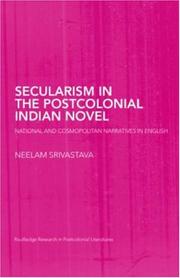| Listing 1 - 1 of 1 |
Sort by
|

ISBN: 9780415402958 0415402956 9780203939345 9781134142163 9781134142200 9781134142217 9780415759502 Year: 2008 Publisher: London Routledge
Abstract | Keywords | Export | Availability | Bookmark
 Loading...
Loading...Choose an application
- Reference Manager
- EndNote
- RefWorks (Direct export to RefWorks)
This study explores the connections between a secular Indian nation and fiction in English by a number of postcolonial Indian writers of the 1980s and 90s. Examining writers such as Vikram Seth, Salman Rushdie, Amitav Ghosh, Shashi Tharoor, and Rohinton Mistry, with particularly close readings of Midnight's Children, A Suitable Boy, The Shadow Lines and The Satanic Verses, Neelam Srivastava investigates different aspects of postcolonial identity within the secular framework of the Anglophone novel. The book traces the breakdown of the Nehruvian secular consensus between 1975 and 2005 through these narratives of postcolonial India. In particular, it examines how these writers use the novel form to re-write colonial and nationalist versions of Indian history, and how they radically reinvent English as a secular language for narrating India. Ultimately, it delineates a common conceptual framework for secularism and cosmopolitanism, by arguing that Indian secularism can be seen as a located, indigenous form of a cosmopolitan identity.
Indic fiction (English) --- Secularism in literature. --- Cosmopolitanism in literature. --- Postcolonialism in literature. --- Identity (Psychology) in literature. --- History and criticism. --- India --- In literature. --- Cosmopolitanism in literature --- Identity (Psychology) in literature --- Postcolonialism in literature --- Secularism in literature --- History and criticism --- Roman indien (de l'Inde) de langue anglaise --- Sécularisme --- Cosmopolitisme --- Postcolonialisme --- 20e siècle --- Histoire et critique --- Dans la littérature --- Histoire de la littérature --- Sécularisme --- 20e siècle --- Dans la littérature --- Histoire de la littérature
| Listing 1 - 1 of 1 |
Sort by
|

 Search
Search Feedback
Feedback About UniCat
About UniCat  Help
Help News
News